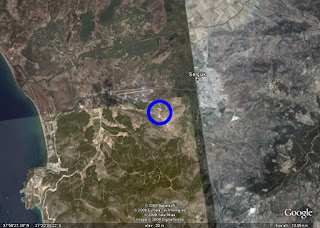 The bird is a Minerva owl, the sacred bird of Athena, patron Goddess of Athens. Athenian coins were universally known as owls. If you bought something at the agora, the stallholder might say, "That'll be three owls." The birds were always printed looking at you sideways with those huge eyes.
The bird is a Minerva owl, the sacred bird of Athena, patron Goddess of Athens. Athenian coins were universally known as owls. If you bought something at the agora, the stallholder might say, "That'll be three owls." The birds were always printed looking at you sideways with those huge eyes.There are three letters down the right hand side. The funny O with the dot in the middle is a capital theta, which carries a th sound. Alpha Theta Epsilon spells out as A(TH)E, the first three letters of the word Athenai (Athens) in Greek.
The pattern in the top left is olive leaves and an olive, the olive plant being Athena's special gift to Athens.
Between the owl and the olives is what looks like a banana but is actually a crescent moon. The moon doesn't appear on any coins before the Battle of Salamis, but does on all coins shortly thereafter. The assumption is Salamis was fought under a crescent moon, but no one really knows.
The obverse side btw had a picture of Athena. I haven't bothered showing the obverse because it's not all that interesting. It's worth noting though this is the first commonly accepted coin to have heads (Athena) and tails (the owl).
Athens didn't have a logo like the famous SPQR of Rome. But to anyone in the ancient world, this coin face instantly screamed Athens.
Athenian coins were the first in history to be accepted across national borders. In those days every city minted its own coins, except for the Spartans, who were convinced this newfangled money stuff would never catch on and stuck with small iron bars as a unit of currency.
In general people in one city would not accept the coins of another. Your average vendor in, say, Mytilene, was unlikely to know the relative value of coins from, say, Thebes, and even if he did, he certainly wouldn't know the relative values of the 20+ other major Greek cities. If that doesn't sound sensible, try this quick quiz: off the top of your head, list the current exchange rate for every major currency in the world relative to the US dollar.
Right. People in the ancient world had exactly the same problem. If you turned up at one city with another city's coins, your first stop was the moneychanger at the local agora.
The moneychangers actually had a tough job. They were effectively setting the exchange rate between city economies. They had to judge largely by the amount of precious metal, usually silver, in the coins, but also had to be wary of cheats. There are plenty of surviving coins that have been chopped so a moneychanger could check what's inside.
But everyone accepted owls (except the Spartans). This coin was the ancient world's equivalent of today's US dollar, until the Roman currency took over, and even then owls were still good as a trading system.
There are people who could glance at this coin and tell you in what year it was minted, because the design of the owl changed subtly over time. I am not one of those people.
This coin is a tetradrachm. 4 drachmas. There were smaller and larger denominations, but the tetra seems to have been the common unit for commercial trading. Its value though is far too high for normal everyday use. For that you wanted a smaller coin called an obol.
1 drachma = 6 obols
An average workman earned about a drachma a day. So most things you bought in the agora would have cost a couple of obols at most. There was even a half-obol coin for small purchases. When you died, the obol was the coin placed under your tongue to pay Charon the Ferryman to get you to the afterlife. The obol had exactly the same owl design as the drachma, but smaller and thinner with less precious metal. Obols were tiny. Here are some pictures I took in the British Museum:

These are all made of silver. The important difference is the size.
#2 & #3 are each side of a tetradrachm
#4 is a didrachma (2 drachma piece)
#5 & #6 are each side of a drachma
#7 is a half drachma (3 obols)
#8 is a quarter drachma (yes, I know that's not an even number of obols)
#9 & #10 are obols
#11 is a half obol
#12 is a quarter obol


There were units higher than the drachma:
1 mina = 100 drachmas
1 talent = 60 minas = 6,000 drachmas
Only the very wealthy and governments dealt in talents.
Why were owls so successful? For much the same reason the USD is ubiquitous today. Because they were so very successful a large number of owls survived. Many have been placed on chains. Theodore Roosevelt is said to have kept one in his pocket.



